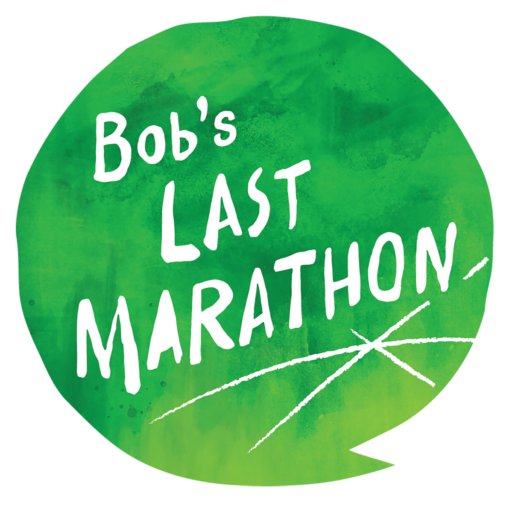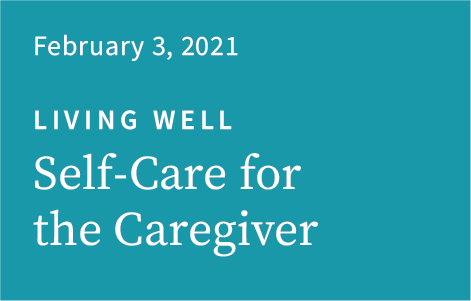Transcript
Self-Care for the Caregiver
Bob and I were at the orientation meeting of a support group for newly diagnosed patients and their families. I could relate to my fellow caregivers in the room. We were bewildered, already weary from dealing with the diagnosis, and struggling to keep up with the relentless changes. At that moment, it dawned on me: This is just the beginning. We were all embarking on a very long journey—years, possibly decades. Was I prepared?
Bob and I had both been long-distance runners in our younger, healthier days. I couldn’t help thinking how much the Alzheimer’s journey was like a marathon. This was no sprint: We’d have to go the distance. And while I had my workout routines down for marathons, I had no idea how to train for this one.
As I took in the anxious expressions of the caregivers around me, I wondered: Who or what was going to save Bob and me? I thought of how emergency oxygen masks drop from an airplane ceiling and how they say to put the mask on yourself before trying to help those around you. I knew then and there that I had to put my oxygen mask on first. Bob needed the best care I could give him, and so I had to do the utmost to care for myself. Bob’s well-being was at stake. If I didn’t care for me, who would care for Bob? And how could a burnt-out me give him the care he needed?
This idea makes logical sense, but it can seem counterintuitive. Our impulse as caregivers is to give all we have to those we love. Some people feel guilty about not putting every bit of energy into caring for their loved one. But it was clear to me that putting energy into myself was, in the end, putting more energy into Bob.
I saw the benefits of caring for myself very quickly. It kept me strong physically and mentally, and more able to care for Bob. It gave me the strength to do the physical work around the house—simple chores like picking up heavy packages, making the bed, doing the laundry, things that Bob was less and less able to do. It gave me the mental clarity to make good decisions. And because I continued activities I always enjoyed, I didn’t carry bitterness or resentment: I could be a positive companion. It is not an exaggeration to say that I’ve emerged from my experiences as a caregiver stronger and healthier, physically and mentally, than ever.
So how did my self-care workout translate into my everyday life? It boiled down to making time to stay healthy. In my case, the backbone of my self-care was an unfailing attention to healthy routines. I took care of my body by eating well, getting rest, and exercising. I kept up with a consistent exercise schedule, eight hours a week, rain or shine.
I also maintained my mental health with psychotherapy, and by carving out some time for the pleasures of life—travel, music, and friends. Bob and I continued to go to concerts. We went to sing-alongs at our local senior center. I hosted recitals at our home.
I continued my travel adventures—sometimes with Bob, sometimes on my own. Traveling has always been an important break from my busy life. When caring for Bob, I needed that respite more than ever. It helped restore me so I could return to my routines strengthened and refreshed.
Bob and I also traveled together. We went to see family and to visit with his doctor, in Philadelphia at Penn Memory Center and later in Boston at Mass General. Seven months before Bob’s passing, we celebrated our 31st wedding anniversary on Kauai, our favorite island. I was worried about Bob’s failing health, but his primary care doctor ran every test he could think of, and told me he found no reason for us not to go. Both his doctor and I were aware this would be Bob’s last trip to Kauai. Miriam, Bob’s home care person, came with us. I still remember that, as we got into the rental car, Bob said, “We made it.”
Bob and I also had routine outings while at home. Every Friday afternoon we had a date for a movie and dinner. Over time, I would need a caregiver to help with Bob’s wheelchair and transport. But we kept our weekly date to the very end.
Supporting the Alzheimer’s Association also strengthened and nourished me by giving me a feeling of connectedness to others like me. I clearly remember the first time Bob and I did the Walk to End Alzheimer’s Disease, on the waterfront in San Francisco. I held back tears watching the people around us. A hush seemed to come over the crowd as we began to walk. There were people of all ages, some in wheelchairs, all of us touched in small and large ways by this disease, but connected, knowing that we were not alone. The Walk became an annual event for us, but it wasn’t until the year after Bob passed away that I realized how rich that experience was, walking with him—side by side, pushing his wheelchair, then having someone else push his wheelchair so we could walk holding hands.
To me, giving our very best to our loved ones doesn’t have to mean sacrificing comfort and pleasure. Years into Bob’s care, there were times I felt discouraged as his disease progressed. But because I cared for myself, I was not burned out. I stayed healthy and was happy to the extent that I could be, and therefore I was a better companion for Bob. I did not sacrifice my personal joys to his care, so there was nothing to feel bitter about. And when the end did come, I was able to find the strength within myself to grieve, while honoring him by pressing on with my life.
Lena Chow Kuhar

